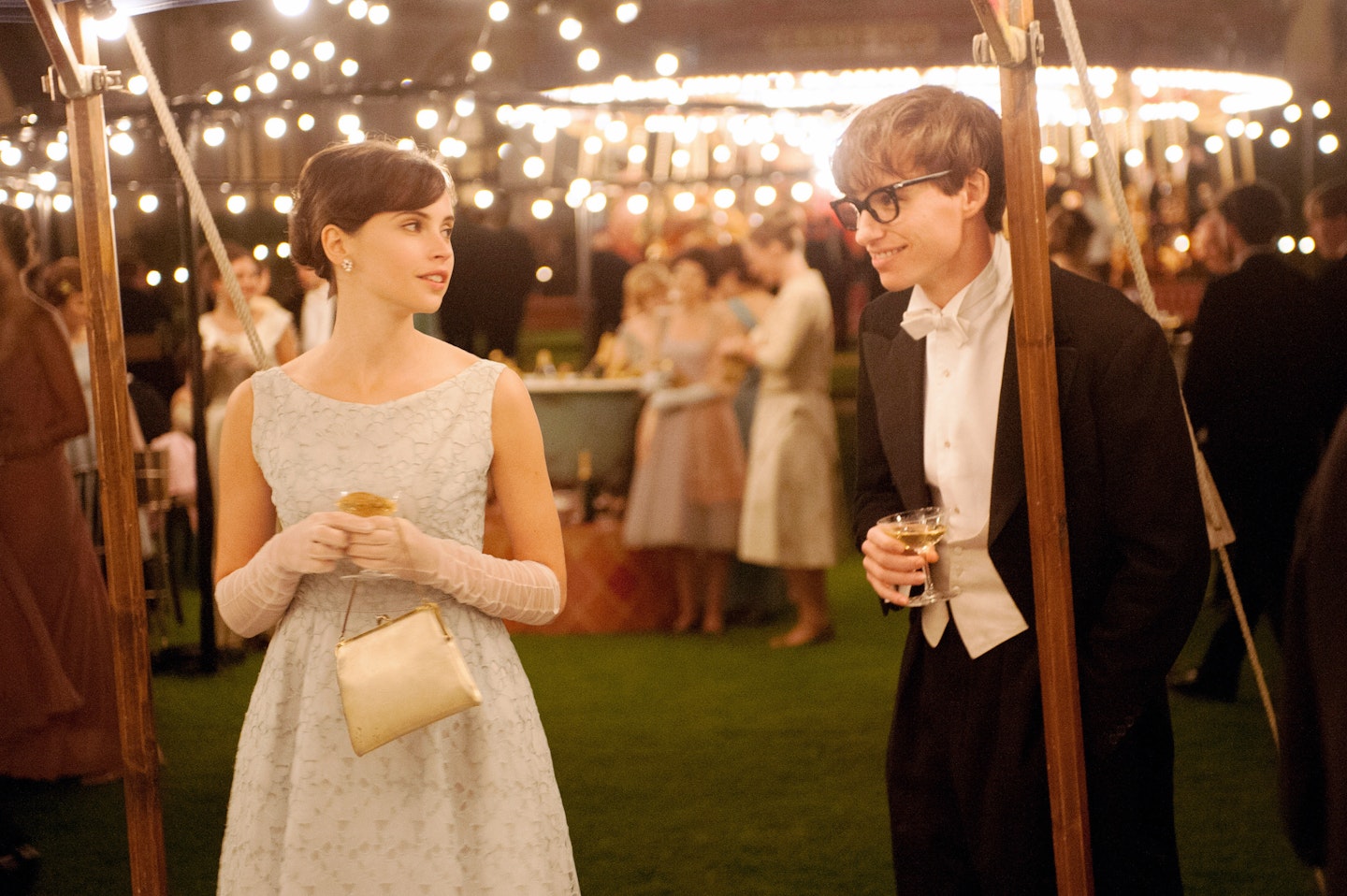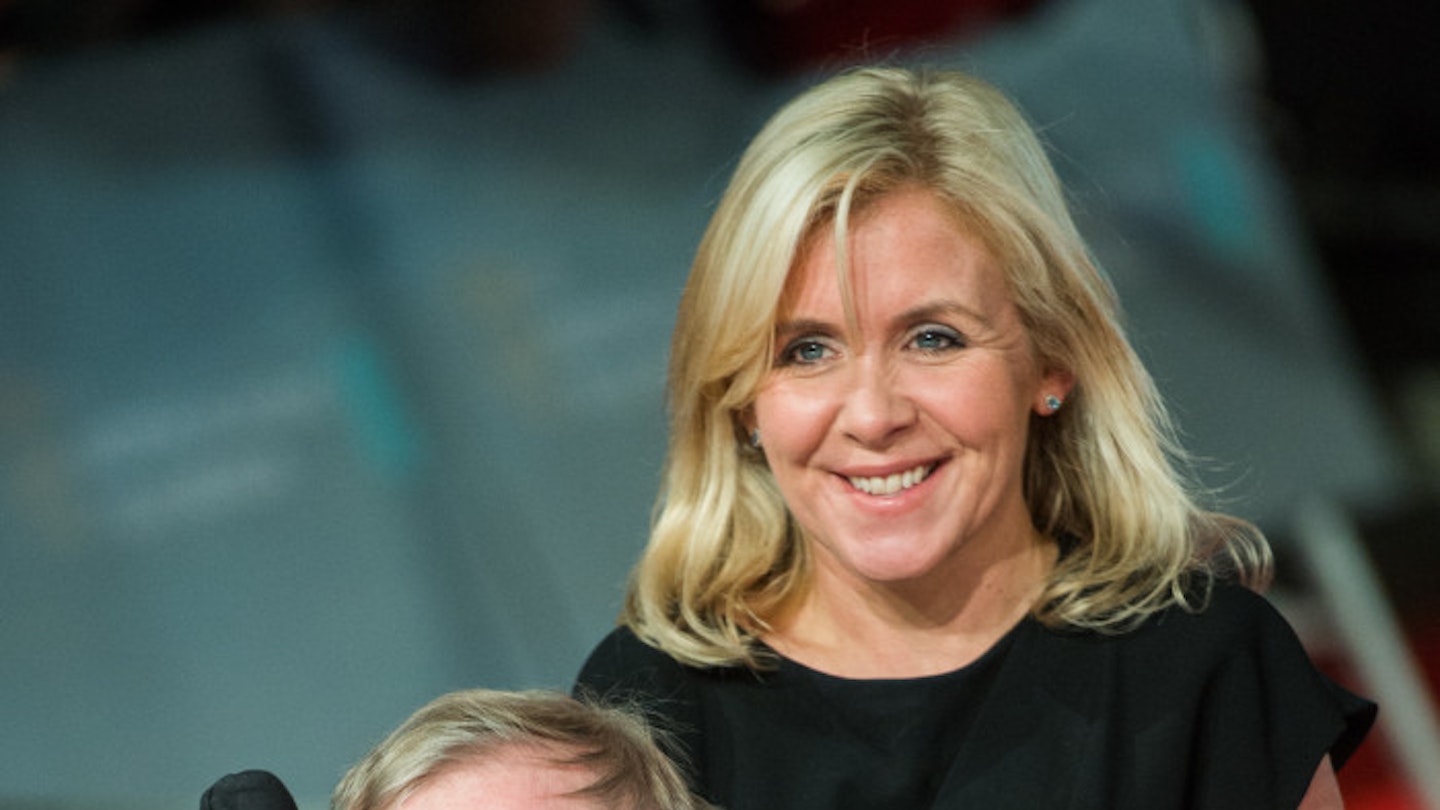When Eddie Redmayne picked up an Oscar for his role as Stephen Hawking, his daughter Lucy watched in tears. Here, she describes seeing her and her father’s life played out on screen.
Since childhood, Lucy Hawking has had a recurring dream where her father Stephen regains the full use of his legs. So it was a surreal moment watching her fantasy come to life on the big screen. ‘There’s a bit towards the very end of The Theory Of Everything where my father goes into a dream world and stands up and walks,’ she explains. ‘It’s exactly like a dream I have, which was astonishing to watch, because I’ve never actually seen him stand up.’
Released in September, the film (which follows the relationship of Lucy’s parents, Stephen and Jane) has won three Golden Globes, three BAFTAs and a SAG Award, as well as Eddie Redmayne’s Oscar. It’s the latest chapter in what has been an extraordinary life. Growing up the middle daughter of the world’s most celebrated astrophysicist, Lucy, 44, has spent years being asked what it’s like to have Stephen Hawking as her dad. Today she says, ‘I read an astronaut describing how flying in space is a strange combination of the extremely ordinary and the deeply extraordinary – and that’s what our lives are like. Day-to-day, my father’s in a wheelchair, he’s profoundly affected by motor neurone disease and there are elements which are very mundane and challenging. But then you have these totally incredible moments where you’re going somewhere amazing and watching him get mobbed by fans.’
"He has a bit of an obsession with setting off fireworks, which I'm trying to tame before he gets an ASBO"
Lucy says they were all thrilled when Eddie won. ‘Dad was on tenterhooks, and I had tears in my eyes when Eddie thanked us in his speech.’ The actor has since promised to visit Cambridge with his statue, with Lucy joking that, ‘I’ll put the kettle on!’ For Lucy, however, the highlight of awards season was the BAFTAs, which allowed Stephen to showcase his wry sense of humour, when he joked on stage about his good looks. ‘People sometimes forget that people with disabilities have personalities. I like it when Dad’s sense of humour comes across. When you think of what he goes through in terms of day-to-day survival, his sense of humour probably helps keep him alive.’
![Stephen Hawking on stage with Felicity Jones at the BAFTAs [Rex]](https://images.bauerhosting.com/legacy/lifestyle-legacy/99/1901f/09cb4/9087e/6f8e8/96a85/32ea5/rexfeatures_4418653by_3914x3060.jpg?auto=format&w=1440&q=80)
Away from the spotlight, she says her father ‘enjoys watching comedy, chilling out at home or having a nice dinner with friends and family. He has a bit of an obsession with setting off fireworks, which I’m trying to tame before he gets an ASBO.’
Lucy first realised her childhood was unusual at school, when the class was asked by a teacher to list their fathers’ jobs. While her classmates’ responses were littered with lawyers and farmers, she laid claim to the only cosmologist. Living in Cambridge, on the ground floor of a modest Victorian house belonging to the college where Stephen lectured, there were lively conversations at the dinner table when the family would be joined by other scientists. Stephen proved to be an invaluable resource when it came to homework – obviously – and Lucy describes him as a hands-on dad who could be relied on as a soft touch, with one caveat: ‘We were banned from watching Top Of The Pops. I think he wanted us to listen to music with a bit more weight.’
But having a dad who suffered from motor neurone disease came with inevitable challenges. Stephen was diagnosed with the disorder, which causes muscle-wasting, aged 21, and Lucy was seven years old when she ‘realised that my father was very ill and could die tomorrow, or next year, or any time’. Certainly, nobody expected him to live to 73. When she was 10, his speech started to deteriorate, and people would ask her and her brother to clarify what he was saying, which she describes as, ‘upsetting for Dad and difficult for us. But you very quickly develop non-verbal cues. He has a well-established facial tick that means yes and another which means no. It comes in handy when he wants to make a quick getaway.’
Lucy first heard her dad’s brand new state-of-the-art synthesised voice when she was 15. ‘He said, “My name is Stephen Hawking”, and everyone went, “Oh! You’re American!” When my little brother was nine or 10, he used to tinker with the machine so that out of the blue my father would say something extremely unlikely, which would make us all laugh.’

Mostly, she remembers people being surprised her dad was out of the house at all. ‘In the ’70s, you never saw a person in a wheelchair having an autonomous life like my father did. It was such a shock. People used to stare at us in the street; it’s undignified to be stared at like that.’ For her friends, though, it was nothing more than a novelty. ‘They were quite fascinated, because it could spin in circles. Some seemed to think it was a gigantic piece of Meccano.’
The Theory Of Everything is based on a memoir written by Lucy’s mum Jane. Famously, she described how she felt that she and their three children had been ‘left behind’ after the cosmologist shot to fame with the publication of his landmark work A Brief History Of Time. They divorced when Lucy was studying at university and, five years later, Stephen married one of his carers, Elaine Mason. They divorced in 2006, but Lucy won’t be drawn to comment on that turbulent time, other than to say: ‘I had a difficult relationship with his second wife, and I haven’t seen her for a long time.’
"Growing up with a father where every day could be his last makes you live in the present"
Starting to work on children’s books with her father in 2007 became, she says, a great opportunity for her to ‘re-establish and strengthen our relationship’. Today, Lucy is a prolific author, having gone on to publish two novels and co-author four children’s books. So, did her background drive her to overachieve? ‘I think growing up with a father where every day could be his last makes you live in the present and do everything now because there may not be time. Time was always such a presence, “[it was like] we’re running out of time, we don’t have time, move on, keep going.” And I think that became a big compulsion.’
When Stephen watched his life unfold on the big screen, he cried throughout, quipping that it needed, ‘more physics and fewer feelings’. What did Lucy take away from seeing the film? ‘The thing that it bought home for me is that even though my parents are divorced and we’ve all grown up, we are very much a family. We’ve been through disability, acute illness, long-term fame, genius… and yet we’re all still together.’
‘George And The Unbreakable Code’, the latest book in the George series by Lucy & Stephen Hawking, is available to buy now (£6.99, Penguin Random House)
